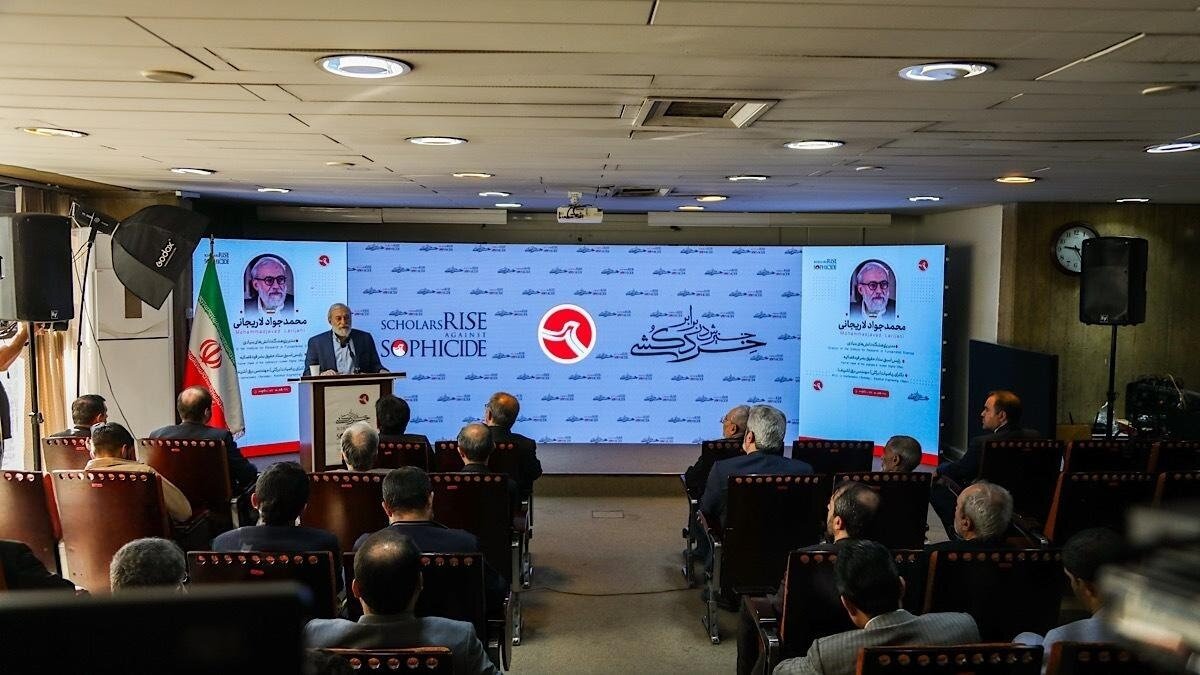Scholars worldwide unite in Tehran to condemn ‘Sophicide’

TEHRAN — Leading intellectuals, scientists, philosophers, and religious figures from across the world gathered in Tehran on Thursday for an international conference titled “Scholars Rise Against Sophicide”, to denounce the deliberate targeting of scientists and thinkers and to defend the sanctity of knowledge and scholarship.
The event was hosted by the Institute for Research in Fundamental Sciences (IPM).
In his keynote address, Dr. Mohammad Javad Larijani, head of IPM and chair of the conference, underscored the historical and civilizational significance of protecting intellectuals and scientists from what he described as “a global war on wisdom.”
The concept of Sophicide—literally “the killing of wisdom”—was elaborated on by Dr. Yaqub Sarraf from Lebanon, who traced its origins to ancient civilizations.
“I personally witnessed the assassination of leading Lebanese figures,” Sarraf said. “That marked the beginning of a broader campaign of Sophicide, a phenomenon seen in ancient Mesopotamia and Greece, and even during the World Wars, when scholars were targeted for their intellectual capacity.”
He explained that the term derives from Sophia (wisdom) and the suffix –cide (to kill), noting its resemblance to genocide: “Repressive powers have long used Sophicide as a pretext to eliminate political and strategic opponents and to achieve their military aims.”
He warned that Iran has been a prime target, with at least sixteen scientists assassinated in recent years in an effort “to disrupt Iran’s deterrent capability and technological development.”
Dr. David Miller, a British scholar and former Princeton University professor, spoke about systemic suppression of anti-Zionist academics in Western universities.
“I was dismissed from Princeton for criticizing Zionists and supporting Palestine,” he said. “In the UK, we are witnessing direct assaults on intellectuals, while in Gaza, the Zionists are targeting doctors, journalists, and public officials.”
Miller accused Zionist organizations of controlling intellectual and media spaces through censorship, dismissals, and intimidation.
“The people of Britain know what’s happening in Gaza—they see genocide unfolding before their eyes.”
He said the “Greater Israel” project has now entered a new phase aimed at dominating West Asia, adding that Israel, having lost its moral legitimacy, is now “eradicating the intellectual elites of the region.”
Miller warned of potential renewed attacks on Iranian scientists, calling these actions part of a “global Sophicide project.”
From China, Dr. Jin Liangxiang, a senior researcher at the Center for West Asian and African Studies, discussed Western efforts to monopolize science and suppress technological progress in the Global South.
“The West seeks to keep knowledge exclusive,” he said. “The only path to development for the Global South is to break these monopolies and promote open access to knowledge.”
He praised Iran’s scientific independence and resilience, noting that its nuclear and technological advances “challenge the Western perception of global knowledge hierarchy.”
Ayatollah Abbas Ka’bi, member of Iran’s Assembly of Experts, condemned the assassination of Iranian nuclear scientists and intellectuals as “crimes against humanity and assaults on Islamic civilization.”
Recalling historical examples from the destruction of libraries in Alexandria to modern-day assassinations, he said such acts reflect ongoing attempts “to undermine Islamic thought and rational capacity.”
“Crimes against scholars are not merely crimes against humanity—they are betrayals of the divine order,” he said, emphasizing Islam’s view of knowledge as sacred.
The cleric added that the killing of scientists, doctors, and researchers—from the 20th century to the present—has sought to block technological independence and civilizational progress in nations.
Ka’bi detailed Iran’s ongoing efforts to protect its scientists through cybersecurity, data protection, and the promotion of scientific culture. He urged international recognition of Sophicide as a distinct crime under international law and concluded with a prayer for the martyred scientists, describing their knowledge as “the heritage of human civilization.”
Professor Tim Anderson, political economist from Australia, warned that the United States—though no longer a leader in technology—continues to dominate finance and propaganda.
He denounced Washington-based institutions such as the Institute for Science and International Security (ISIS) for “praising the murder of 20 Iranian scientists” during Israel’s June attacks, calling it “a grotesque inversion of morality.”
“These so-called scientific bodies in Washington now endorse the killing of knowledge itself,” he said, recounting his visit to the home of slain physicist Ahmad Reza Zolfaghari Daryani in Tehran.
“Such barbarity is disguised under the false narrative of ‘Weapons of Mass Destruction’ to justify aggression against Iran.”
Anderson called for global cooperation among independent media and nations “to break the U.S. propaganda monopoly” and “ignite a global awakening from Tehran.”
Concluding the series of international addresses, Professor Andrei Brozukov of Russia drew parallels between attacks on Iranian and Russian scientists.
“The aim of these terrorist acts is to halt our countries’ progress and frighten our scientists,” he said. “But they will not succeed. In both Iran and Russia, patriotic youth stand ready to take their place.”
He extended condolences to the families of assassinated scientists, expressing confidence that “our nations will overcome and build a better, more humane world.”
The event concluded with remarks by Dr. Ajamu Baraka, U.S. Green Party politician and activist, followed by the reading of the final resolution, which reaffirmed the participants’ collective commitment to defend scientific freedom, resist the monopolization of knowledge, and expose the perpetrators of “Sophicide” worldwide.
Leave a Comment